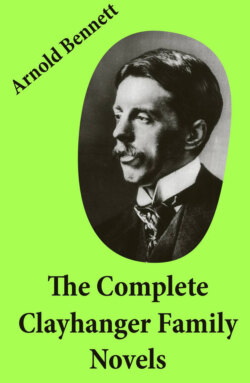Читать книгу The Complete Clayhanger Family Novels (Clayhanger + Hilda Lessways + These Twain + The Roll Call) - Arnold Bennett - Страница 160
На сайте Литреса книга снята с продажи.
Chapter 18. Curiosity.
ОглавлениеTable of Contents
He was afraid that, from some obscure motive of propriety or self-protection, she would bring Janet with her, or perhaps Alicia. On the other hand, he was afraid that she would come alone. That she should come alone seemed to him, in spite of his reason, too brazen. Moreover, if she came alone would he be equal to the situation? Would he be able to carry the thing off in a manner adequate? He lacked confidence. He desired the moment of her arrival, and yet he feared it. His heart and his brain were all confused together in a turmoil of emotion which he could not analyse nor define.
He was in love. Love had caught him, and had affected his vision so that he no longer saw any phenomenon as it actually was; neither himself, nor Hilda, nor the circumstances which were uniting them. He could not follow a train of thought. He could not remain of one opinion nor in one mind. Within himself he was perpetually discussing Hilda, and her attitude. She was marvellous! But was she? She admired him! But did she? She had shown cunning! But was it not simplicity? He did not even feel sure whether he liked her. He tried to remember what she looked like, and he positively could not. The one matter upon which he could be sure was that his curiosity was hotly engaged. If he had had to state the case in words to another he would not have gone further than the word ‘curiosity.’ He had no notion that he was in love. He did not know what love was; he had not had sufficient opportunity of learning. Nevertheless the processes of love were at work within him. Silently and magically, by the force of desire and of pride, the refracting glass was being specially ground which would enable him, which would compel him, to see an ideal Hilda when he gazed at the real Hilda. He would not see the real Hilda any more unless some cataclysm should shatter the glass. And he might be likened to a prisoner on whom the gate of freedom is shut for ever, or to a stricken sufferer of whom it is known that he can never rise again and go forth into the fields. He was as somebody to whom the irrevocable had happened. And he knew it not. None knew. None guessed. All day he went his ways, striving to conceal the whirring preoccupation of his curiosity (a curiosity which he thought showed a fine masculine dash), and succeeded fairly well. The excellent, simple Maggie alone remarked in secret that he was slightly nervous and unnatural. But even she, with all her excellent simplicity, did not divine his victimhood.
At six o’clock he was back at the shop from his tea. It was a wet, chill night. On the previous evening he had caught cold, and he was beginning to sneeze. He said to himself that Hilda could not be expected to come on such a night. But he expected her. When the shop clock showed half-past six, he glanced at his watch, which also showed half-past six. Now at any instant she might arrive. The shop door opened, and simultaneously his heart ceased to beat. But the person who came in, puffing and snorting, was his father, who stood within the shop while shaking his soaked umbrella over the exterior porch. The draught from the shiny dark street and square struck cold, and Edwin responsively sneezed; and Darius Clayhanger upbraided him for not having worn his overcoat, and he replied with foolish unconvincingness that he had got a cold, that it was nothing. Darius grunted his way into the cubicle. Edwin remained in busy idleness at the right-hand counter; Stifford was tidying the contents of drawers behind the fancy-counter. And the fizzing gas-burners, inevitable accompaniment of night at the period, kept watch above. Under the heat of the stove, the damp marks of Darius Clayhanger’s entrance disappeared more quickly than the minutes ran. It grew almost impossible for Edwin to pass the time. At moments when his father was not stirring in the cubicle, and Stifford happened to be in repose, he could hear the ticking of the clock, which he could not remember ever having heard before, except when he mounted the steps to wind it.
At a quarter to seven he said to himself that he gave up hope, while pretending that he never had hoped, and that Hilda’s presence was indifferent to him. If she came not that day she would probably come some other day. What could it matter? He was very unhappy. He said to himself that he should have a long night’s reading, but the prospect of reading had no savour. He said: “No, I shan’t go in to see them to-night, I shall stay in and nurse my cold, and read.” This was mere futile bravado, for the impartial spectator in him, though far less clear-sighted and judicial now than formerly, foresaw with certainty that if Hilda did not come he would call at the Orgreaves’. At five minutes to seven he was miserable: he had decided to hope until five minutes to seven. He made it seven in despair. Then there were signs of a figure behind the misty glass of the door. The door opened. It could not be she! Impossible that it should be she! But it was she; she had the air of being a miracle.
